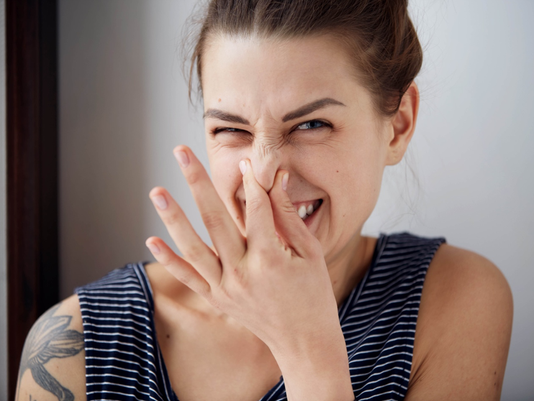Whether your breath reeks or your feet stink, body odors can act as a powerful looking glass that reflects your health status. Generally, a simple shower or a swig of mouthwash can mitigate the stench. But select cases may require a more systematic approach, attacking the odor at the source. Some conditions and diseases even produce a signature aroma. How do you know if you have a problem?
Start by identifying whether body odors are physiological. For instance, if you’re someone who sweats a lot and your sweat always smells a certain way, that’s normal. But if you notice a change in the smell or you’re sweating more than usual, that’s worth investigating.
How do you know which funky fumes to pay attention to? Here are five potentially problematic scents and what you can do about them:
- Ripe-smelling breath. When your mouth is dry from certain medications, dehydration or a medical condition such as sleep apnea, bacteria can grow and thrive. The simple solution: Drink more water. That usually resolves standard bad breath. If your breath has a fruity scent, we worry about diabetes because when your body can’t create the energy it needs from sugar, it begins breaking down fatty acids for fuel. The ketones that build up in the blood as a result of this process can leave a fruity smell on your breath.
The fix: If you notice a fruity odor on your breath along with fatigue, unexplained weight loss or blurry vision, ask your doctor to test your blood for ketones.
- Body odor. Some people sweat more than others. Kids going through puberty, for example, may produce a signature odor, as do people who are overweight or obese. Diabetes can also produce “off” scents in terms of body odor. But if you notice a sudden change in the amount or smell of your sweat, it could indicate a health problem. Conditions ranging from overactive thyroid to menopause can cause excessive sweating at night or during the daytime.
The fix: If the issue isn’t medical, use deodorant more frequently, shower often and wear lightweight clothing. Still troubled by stinky sweat? You may want to ask your doctor about Botox. People who have significant issues with sweating may experience a noticeable difference with Botox injections in the armpits.
- Stinky feet. Fungus thrives in moist environments. Sweaty shoes and socks are the perfect environment for growing fungus. If you’re growing foot fungus, you’ll probably notice. Athlete’s foot tends to smell worse than regular smelly feet. What’s worse, if you ignore athlete’s foot, the skin between your toes can become soft and moist, increasing the risk for bacterial infections like cellulitis. You can also you spread the fungus to different parts of your body with just a touch.
The fix: Since fungus likes moisture, keep your feet clean and dry. Sprinkle talcum powder on your feet or spray them with antiperspirant spray and keep an extra pair of socks on hand so you can change them frequently. When you’re home, keep your socks off so your feet can dry out. If you do get athlete’s feet, try an over-the-counter antifungal spray like Lotrimin.
- Smelly stool. If you have strong-smelling dark or black stool, that’s an indication there might be blood in the stool. Conditions ranging from colitis to colon cancer can create foul-smelling stools. Other potential culprits: Stool containing mucus or fat could signal your body is having trouble digesting fats. In that instance, irritable bowel syndrome may be an issue.
The fix: Don’t ignore foul-smelling bowel movements. Make an appointment with your doctor and get checked out.
- Foul-smelling urine. Strong-smelling or dark urine can also indicate a problem. Simple dehydration is a common culprit, but smelly urine can also signal a urinary tract infection (UTI). UTIs can produce a pungent, chemical-like aroma.
The fix: If your pee starts to smell funky, check with your doctor, who will likely take a urine sample. If you do have a UTI, a simple antibiotic prescription should wipe out your problem.
The bottom line: If you notice your body is producing a new or unusual smell, don’t ignore it. Even though it may seem embarrassing, talk to your doctor to figure out the source of the problem.
Source: http://detne.ws/2oL0ATk











